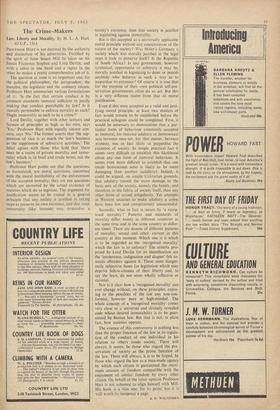The Crime-Makers
Law, Liberty and Morality. By H. L. A. Hart. (0.U.P., 15S.)
PROFESSOR HART is not daunted by the authority and distinction of his adversaries. Fortified by the spirit of John Stuart Mill he takes on Sir James Fitzjannes Stephen and Lord Devlin; and with a sabre in one hand and a rapier in the other he makes a pretty comprehensive job of it.
The question at issue is an important one, for the political philosopher, the jurisprudent, the moralist, the legislator and the ordinary citizen. Professor Hart summarises various formulations of it: Is the fact that certain conduct is by common standards immoral sufficient to justify making that conduct punishable by law? Is it morally permissible to enforce morality as such? Ought immorality as such to be a crime?'
Lord Devlin, together with other lawyers and laymen of principles as high as his own, says 'Yes.' Professor Hart with equally sincere con- cern, says 'No.' The former asserts that 'the sup- pression of vice is as much the law's business as the suppression of subversive activities.' The latter agrees with those who hold that 'there must be a realm of private morality and immo- rality which is, in brief and crude terms, not the
• law's business.'
Professor Hart points out that the questions, as formulated, are moral, questions, concerned with the moral justifiability of the enforcement of the accepted morality; they are not questions which are answered by the actual existence of societies which do so legislate. The argument for justification seems to be rooted in a general principle that any society is justified in taking steps to preserve its own existence, and that since immorality (like treason) may jeopardise a society's existence, then that society is justified in legislating against immorality.
But is this accepted as a universally applicable moral principle without any consideration of the nature of the society? Was Hitler's Germany a society which was morally justified in the legal steps it took to preserve itself? Is the Republic of South Africa? Is any government, however tyrannical, opportunist or arbitrary it may be, morally justified in legislating to deter or punish anybody who behaves in such a way as to jeopardise its existence? Of course it is true that for the purpose of their own political self-pre- servation governments often do so act. But this is a very different realm from that of moral justification.
Even if this were accepted as a valid and justi- fying moral principle, at least two matters of fact would remain to be established before the practical syllogism could be completed. First, it would be necessary to demonstrate that a par- ticular form of behaviour commonly accepted as immoral, for instance adultery or homosexual acts between men (or. for that matter, between women), was in fact likely to jeopardise. the existence of society. In simple practical fact it seems very difficult to establish this likelihood about any one form of immoral behaviour. It seems even more difficult to establish that one (male homosexual acts) is likely to be more damaging than another (adultery). Indeed, it could be argued, on simple Utilitarian grounds, that adultery caused the more damage to the basic unit of the society, namely the family, and therefore to the fabric of society itself, than any other form of sexual irregularity. Yet attempts in Western societies to make adultery a crime have been few and conspicuously unsuccessful.
Secondly, what in fact is meant by 'a recog- nised morality"? Patterns and standards of morality differ widely in different countries at the same time and in the same country at differ- ent times. There are dozens of different patterns of morality, sexual and other, current in this country at this moment. Which one is it which is to be regarded as the 'recognised morality' which the law is to enforce? The criteria pro- posed by Lord Devlin for its identification are the 'intolerance, indignation and disgust' felt to- wards offenders against it. These. seem danger- ously subjective bases for legislation which may deprive fellow-citizens of their liberty and, to say the least, do not seem wholly reflective or rational.
Nor is it clear how a 'recognised morality' can ever change without, on these principles, expos- ing to the penalties of the law 'any non-con- formist, however pure or high-minded. The whole concept of a 'recognised morality' comes very close to a universal and divinely revealed code whose desired immutability is to be guar- anteed by human law. But that is not, in plain fact, how societies operate.
The essence of this controversy is nothing less than the proper function of the law in its regula- tion of the conduct of one individual in his relation to others inside society. There will always, it seems, be those who regard the pre- servation of society as the prime function of the law. There will always, it is to be hoped, be those who regard the law as a man-made agency by which each citizen is guaranteed the maxi- mum amount of freedom compatible with the enjoyment of similar freedom by every other citizen. On behalf of the latter opinion Professor Hart is not ashamed to align himself with Mill. His book is a slim one, for its price; but it is well worth its twopence a page.
J. F. WOLFENDEN






































 Previous page
Previous page